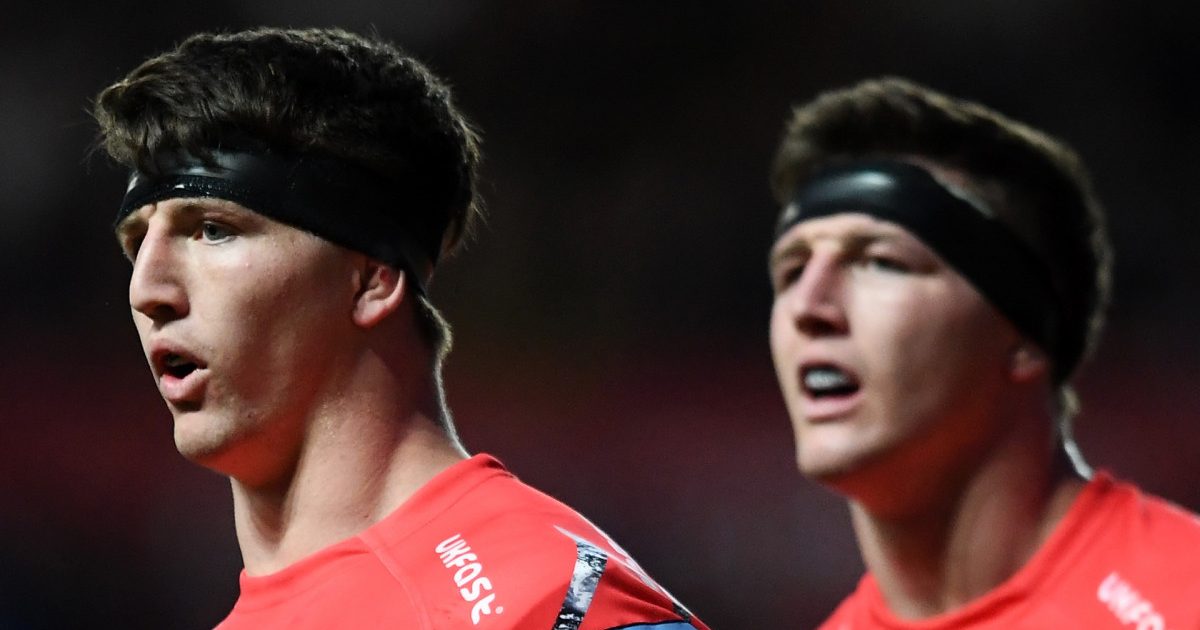'We're trying to work out whether we have got Ben Curry or Tom Curry here'

Eddie Jones is revelling in the novelty of having a revamped England squad – including rookie Ben Curry, the identical twin of Lions pick Tom – at his disposal for the three-game summer series which gets started with this Sunday’s A team game versus Scotland in Leicester. Twenty-one uncapped players were named in the initial training squad of 34 and there are now 23 uncapped players in the squad after the numbers were increased to 36 at the start of this week.
Of the capped players just four are in double figures, forwards Ellis Genge, Charlie Ewels and Sam Underhill along with scrum-half Dan Robson, so Jones and his fellow coaches have their hands full coaching a collection of players they are greatly unfamiliar with at international level.
Jones tried to see the lighthearted side of this situation on Thursday when quizzed by RugbyPass about the influx of so many newcomers for a series that will continue with July Test games at Twickenham versus the USA and Canada once the A team warm-up is out of the way after this weekend.
“There are so many new faces, when they have their masks on I have been scratching to work out who’s who. We’re trying to work out whether we have got Ben Curry or Tom Curry here,” quipped Jones about the lack of familiar faces in the England set-up.
“I used to play with the Ella brothers and they had little tricks. I remember when Mark was captain of the Wallabies he sent Glen up to a press conference and no one knew who it was. I don’t know whether I have got Ben or Tom Curry here, so we are trying to work that one out.
Another England rookie bites the dust https://t.co/tG1tYItH0W
— RugbyPass (@RugbyPass) June 24, 2021
“But no, there is a lot of guys here who have got an opportunity in front of them. The enthusiasm from the squad is first class. There is a run of three games here, which starts with Scotland A on the weekend, where they can really put themselves forward as genuine Test players for the World Cup in 2023. We are at a period now where we are two years away from the World Cup so the squad starts to take a bit of mould and we need fresh blood and need fresh energy. These guys have got one foot in the door and they have got to make sure they keep the door open.”
It was earlier this month when Jones defended his consultancy coaching at club level in Japan in the wake of the desultory fifth-place Guinness Six Nations finish by England. He insisted at the time that he needed to practise coaching elsewhere as his England job covered just a dozen hands-on weeks in a year. How then does he feel about suddenly having his work cut out with so many English rookies looking to him for instruction and guidance?
“Yeah, it always is (refreshing) when you work with fresh talent. You want to see where you can take them. The less they have played at this level the more they tend to listen because experienced players tend to know what they need to do and your coaching is less when you have got experienced players.
“But these guys, we have got to guide and direct a bit more so the hands-on coaching has been more evident than it would be with a more experienced squad so we have enjoyed that. We like the look of where they are going. They train with enormous energy. We just need to execute a bit better, which we will get in the next few days, and we are looking forward to a strong performance on Sunday.”
A team games are a rarity in the modern era. It was 2016 when the Saxons, the old name given to the England understudy team, last played a match. However, as enthusiastic as Jones sounded about this Sunday’s clash with Scotland A, he doesn’t envisage this level of the international game enjoying a revival any time soon.
“What we have got to find is a few more weeks in the year,” he jibed. “These start-up companies can invent anything these days, so why can’t they invent a year with 58 weeks? If we have 58 weeks we could have six A games. Wouldn’t that be great? If you have got someone who has got some money who can do a bit of creative work on the calendar we can create a few more weeks.”
The making of Maro Itoje ?
Jim Hamilton was lucky enough to spend some time with Vitality ambassador and former teammate @maroitoje before he heads to South Africa ? @Vitality_UK
EP 1 – https://t.co/CIOmpi9Q2K pic.twitter.com/tSUOl348QX— RugbyPass (@RugbyPass) June 24, 2021

































































